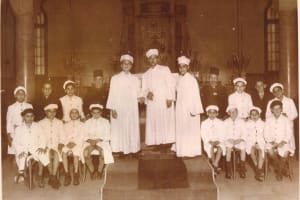Ancient sites opened for Passover holiday, including Solomon’s Pools and short trips into Syrian territory
The biblical site of the Covenant of the Pieces has also been made accessible

Many of Israel’s scenic sites have been eerily silent over the last year and a half, closed to the public for security reasons. Now together with the Israel Defense Forces (IDF), Passover heritage programs have secured access to sites that have been closed, including some locations that have never been open to Israelis before.
Travel within sensitive areas, particularly in the Palestinian Territories, is not often an option for Israelis at the best of times. With pre-organized tours and careful coordination with the army, trips to places like Jericho can be made possible, but many of these sites have been strictly off-limits during the war precipitated by the Oct. 7 attacks. Even sites within Israel proper have been closed in areas vulnerable to attack, especially in the north of the country.
However, on Thursday the IDF announced they will be arranging military-approved guided tours of several sites close to the northern border and into Syria itself, as well as supervised tours to Solomon’s Pools near Bethlehem in Palestinian Authority-controlled area.
YNet News reports that northern sites along the borders of Lebanon and Syria, including the Ruqqad stream which flows out of Syria into the Golan Heights, the Al-Hamma Bridge on the Yarmouk River, the Hijaz railway tunnel, and Mount Dov near Mount Hermon have all been made accessible. Moreover, Israeli civilians will be allowed for the first time since the founding of the state to step foot in Syria.
Mount Dov is thought to be the biblical site of the Covenant of the Pieces, a foundational biblical event described in Genesis 15, in which God makes a covenant with Abram (later Abraham), promising him descendants, land, and a special relationship.
The initiative, named “Returning to a Safer North,” has been led by the IDF Northern Command and 210th Division, together with local municipalities and the Israel Nature and Parks Authority. The option to see inside Syria was so popular that the trips sold out almost immediately.
Similarly, Solomon’s Pools, an ancient water site which was a crucial part of the water system that served Jerusalem, particularly during the Second Temple and later Roman and Byzantine-era, has been out of bounds for Israelis for over 25 years. A separate initiative to open this site has also been pioneered by Gush Etzion Tourism together with the Kfar Etzion Field School.
A disappointed Israeli hoping to see the pools wrote on Trip Advisor back in 2021, “Jewish tourists can only look from afar, best view from above Road 60 or from the northern tip of the city of Efrat. Sadly this is the case, and we can only hope access will not be denied according to this criteria in the future” adding that it “could happen if authorities cooperate with Israel, I hope this happens soon.”
Now the three large reservoirs filled by natural springs, a testament to ancient water engineering, are finally open to both Arab and Jewish Israelis as part of this new initiative for the Passover break. Situated in area A of the Palestinian Territories, travel to the pools which once supplied Jerusalem with water via aqueducts has been prohibited for Israelis for over two decades. However, the Kfar Etzion Field School is offering visitors special access to the site on April 17:
"Visitors will arrive in bulletproof buses, accompanied by professional guides and under special approval from the IDF," the school said in a statement. “This is a rare chance to witness a biblical-era site up close, connect to thousands of years of history and celebrate Passover in the heart of the Judean Hills,” the statement continued. “The IDF-approved, fully secured tour offers a unique mix of heritage, nature and inspiration for the whole family.”
Time will tell whether access to these sites remains limited in the future, but due to exceptionally high demand, the IDF has announced some additional tour dates for trips to the Syrian border.

Jo Elizabeth has a great interest in politics and cultural developments, studying Social Policy for her first degree and gaining a Masters in Jewish Philosophy from Haifa University, but she loves to write about the Bible and its primary subject, the God of Israel. As a writer, Jo spends her time between the UK and Jerusalem, Israel.














